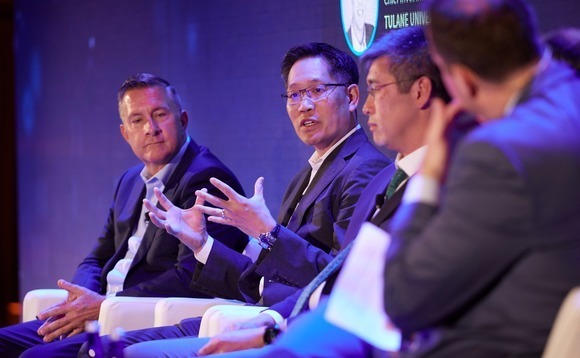
Global LPs steer clear of China - Mergermarket Forum

Geopolitical uncertainty is making global institutional investors increasingly risk-off on Asian private equity – and on China in particular – at a time when overallocation issues are already restraining the pace of commitments to the asset class.
"Four years ago, they asked me to double our Asia allocation from 5% to 10% and even 15% but now they are asking me to cut it back from the 10% we didn't even get to," Greg Jania, global co-head of private equity at APG Asset Management, which manages EUR 550bn (USD 600bn) for Dutch pension plans, told the Mergermarket Private Equity Forum in New York.
"Political winds are strong right now, even for a small country like the Netherlands. Some clients ask us to write in their contracts, ‘No China exposure.' The war of words in the economy is hitting home. I've been going to China for 20 years and I wouldn't have thought I would see this happen, but it's going to hurt growth for companies across the portfolio and it's here to say for a while."
Allstate Investments has USD 6bn in private equity and infrastructure, out of an overall portfolio of USD 60bn. One-third of its annual PE budget is typically deployed outside of North America with an even split between Asia and Europe. However, Michael Barzyk, global head of private equity, noted that the insurance company went risk-off on Asia 18-24 months ago.
"We've effectively stopped putting capital to work in China," he said. "We think the risk-return trade-off in the near to medium term just isn't there."
The Pritzker family foundation, which has about 60% of its USD 1.5bn in assets under management (AUM) in private assets, and the Tulane University endowment, where private equity accounts for about one-third of the USD 2bn portfolio, are similarly minded. Both are exploring opportunities in Southeast Asia and India, either as a China proxy or to achieve greater diversification in the Asia allocation.
"We have some allocation to China that we are not actively re-upping with, and we are looking elsewhere in Asia at places where we don't have as much exposure," said Richard Chau, Tulane's CIO, highlighting India, Southeast Asia, Japan, and Korea. "In the past, China has sucked up all our Asia allocation. Now we can look around and see where else we can spread that."
In the most part, GPs are competing for slices of smaller budgets. With private markets yet to experience – or report – the same valuation declines as public markets, LPs are hamstrung. APG lost EUR 100bn in public equities and fixed income last year, while private equity was marked up. Consequently, the PE allocation shot past 10% in 2022, having been below the 6% target less than 12 months earlier.
Jania's team committed USD 9bn to funds and co-investments in 2021. That fell to USD 4bn last year and much the same is expected in 2023. Average cheque sizes for funds have fallen from USD 400m to USD 250m. "Even if we didn't invest a dime in the PE programme over the next two years, we would still be overallocated given the denominator," Jania added.
Increasing the private equity allocation is unlikely – the pension plan is fully funded and elevated interest rates mean it can largely rely on fixed income investments to stay there. David Chiang, Pritzker's CIO, has asked his board to move the private assets allocation above 60%.
"As long as we get paid for the illiquidity, it's an arbitrary number. People get tense when the number gets higher, but we've mapped out the liquidity and we are comfortable with that," he said.
Even though they might be constrained regarding cheque size and more selective on re-ups and new commitments, LPs are trying to take advantage of the weaker fundraising environment to fill gaps in their portfolios and extract better terms from GPs. Concessions tend to involve increased co-investment and greater transparency on environment, social, and governance (ESG); no one is giving ground on fees.
Allstate, for example, is looking to boost its exposure to emerging and first-time managers. "We've been successful historically in identifying and backing those folks, and we think this is a moment in time where having deployed consistently year over year and having that muscle memory of backing emerging managers in prior periods of dislocation, it is very interesting for us," said Barzyk.
The current dislocation extends to even the largest players in the market. According to Jania, the global multi-strategy managers are stalling on fundraises at two-thirds of their targets and some industry bellwether names are taking twice as long to raise what they did in the previous vintage. And it is especially difficult for Asia-based GPs, given the reassessment of China risk.
"We are seeing funds that last time were USD 6bn-USD 7bn and they can't even get to USD 2bn closes," Jania added. "It could be a very good vintage for funds that can raise some money, but a lot of people don't think it's worth it."
Latest News
Asian GPs slow implementation of ESG policies - survey
Asia-based private equity firms are assigning more dedicated resources to environment, social, and governance (ESG) programmes, but policy changes have slowed in the past 12 months, in part due to concerns raised internally and by LPs, according to a...
Singapore fintech start-up LXA gets $10m seed round
New Enterprise Associates (NEA) has led a USD 10m seed round for Singapore’s LXA, a financial technology start-up launched by a former Asia senior executive at The Blackstone Group.
India's InCred announces $60m round, claims unicorn status
Indian non-bank lender InCred Financial Services said it has received INR 5bn (USD 60m) at a valuation of at least USD 1bn from unnamed investors including “a global private equity fund.”
Insight leads $50m round for Australia's Roller
Insight Partners has led a USD 50m round for Australia’s Roller, a venue management software provider specializing in family fun parks.








